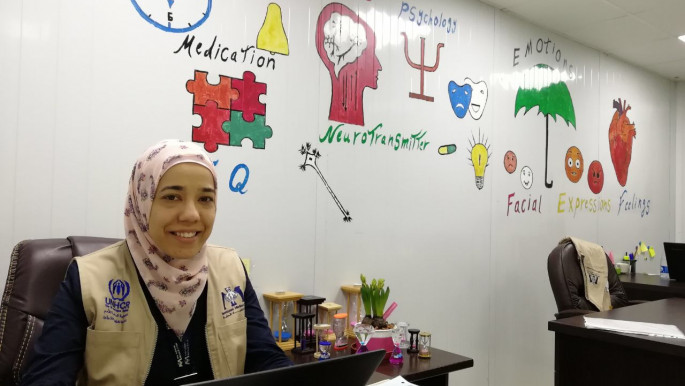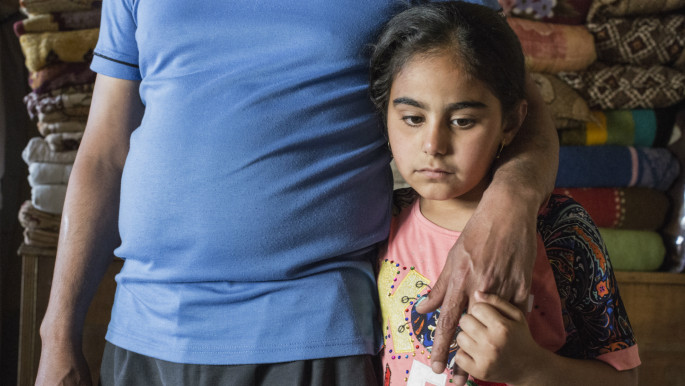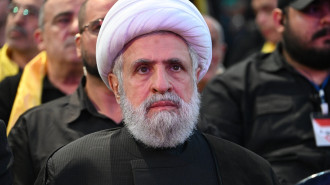'The remedy of a soul': Mental health worker Hadeel Naser helps Syrian refugees heal
"Not everybody can do this job," says Hadeel Naser about her mental health work with International Medical Corps in Azraq Camp, a refugee camp in Jordan for displaced Syrians. "What makes us different?" she asks. "We work with the soul."
As a global first responder for over 30 years, International Medical Corps' medical professionals know a ton about the human body: how to perform lifesaving operations, treat chronic illnesses, address and prevent infectious diseases, and bring children back from the brink of starvation. But matters of the mind and heart can be more mysterious.
"When you work with clients who have mental illness, you deal with their souls: the most sensitive, delicate part of our bodies. You touch their pain closely," says Hadeel.
Born in Baton Rouge, Louisiana, Hadeel grew up in Jordan, where she graduated with a Bachelor's degree in occupational therapy.
Hadeel uses her degree, along with the training she obtained in mental health case management, as a Mental Health Programme Officer working with Syrian refugees.
But a university degree is not enough, Hadeel makes sure to remind me. And as she describes what it takes to do her job well, I begin to see it as an art form – this searching for the remedy of a soul.
I learn that, as a mental health practitioner, you offer clients unconditional emotional support and ongoing comfort. You remain painstakingly patient and you follow up relentlessly.
You take people as they are, wherever they are, no matter their circumstances, customs or beliefs. Knowing that one word can make or break someone's spirit, you choose your words carefully and wisely. You understand that progress can be incredibly subtle, and relapses can be violent. So, you remind your clients, over and over, how brave they are for fighting to recover. To me, this sounds like love.
 |
You understand that progress can be incredibly subtle, and relapses can be violent. So, you remind your clients, over and over, how brave they are for fighting to recover. To me, this sounds like love |  |
 |
|
| Hadeel Naser is a Mental Health Officer in International Medical Corps' Jordan programme [International Medical Corps] |
The work is also fundamentally holistic and wildly specific. As an International Medical Corps mental health worker, you learn to do a comprehensive mental health assessment for each client, Hadeel explains.
This means discovering exactly your client's unique needs by journeying through the full spectrum of their being: their hobbies, interests, beliefs, family situations, early childhood experiences, and on and on. All of it is connected and it connects all of us – this recognition that pain and trauma afflicts everyone and how potent a medicine compassion can be.
Very few humanitarian relief organisations prioritise mental health and psychosocial support in the way that International Medical Corps does.
Yet in a place like Azraq Camp, full of refugees escaping violence who live in uncertain circumstances while processing their harrowing losses, tending to emotional health can be critical to survival.
That's why International Medical Corps takes a whole person approach to relieving suffering globally, utilising innovative mental healthcare and psychosocial support tools like case management, cognitive therapy, relaxation techniques, positive visualisation and more.
 |
Low-income countries have an average of one psychiatrist for every two million people |  |
With mental illness accounting for 4 of the 10 leading causes of disability worldwide, the need for these services is enormous, but the gap in providing them is substantial.
 |
|
| Read also: The scars of war: Mosul's children haunted a year after Islamic State was routed |
Low-income countries have an average of one psychiatrist for every two million people. Across the globe, International Medical Corps takes a leadership role in mental health by contributing to and working in line with national and global guidelines for improving mental health and well-being among displaced and crisis-affected populations.
Such communities have multiple and complex needs and require a comprehensive mental health and case management approach, which helps identify, support and protect those who are vulnerable while promoting stability and recovery.
Through decades designing integrated health programmes, International Medical Corps has achieved significant breakthroughs in the global fight for comprehensive mental health care in emergency settings, successfully helping to break down barriers to access, educate communities and train local health care workers.
By building human resource capacity for mental health service provision among general health care staff, along with more specialised providers like psychologists, social workers and psychiatrists, International Medical Corps strengthens national health systems.
The organisation also increases the availability of accessible, non-stigmatising, culturally acceptable and high-quality mental health services by integrating services at the community level and bringing care directly to those who need it the most.
 |
In Jordan, girls are often forbidden from accessing mental health services because their families believe this will affect their marriage prospects |  |
To reach those most in need, Hadeel drives two hours each way to reach Azraq Refugee Camp from her home in Amman.
I can hear the fatigue in her voice as she talks to me after a long day. Her work can be physically and emotionally draining, but she says her team members step in to help one another as needed. Her family, too, remains a bastion of support. Even when she comes home exhausted, Hadeel's parents encourage her to keep helping others.
For Hadeel, helping also means fighting the widespread stigma associated with mental health. She says that in Jordan, girls are often forbidden from accessing mental health services because their families believe this will affect their marriage prospects.
Hadeel feels strongly that if she can help de-stigmatise the work of her and her colleagues, more people, especially girls, will be able to access the mental health care they need. And as she states with conviction through her exhaustion how she plans to devote her life to this cause, I recognise it in her voice: the kind of passion and determination that only comes from a labour of love.
This World Mental Health Day (October 10), we honour frontline health workers like Hadeel who tirelessly dedicate their lives to helping heal invisible scars across the globe.
Sonia Lowman is the Senior Communications Specialist at International Medical Corps.
|
About International Medical Corps' Jordan Mental Health and Psychosocial Support Programme: Hadeel Naser (Alhayek) is a Mental Health Officer in International Medical Corps' Jordan programme, which aims to strengthen mental health care services for refugees and vulnerable Jordanians by integrating mental health into primary health care services. |





 Follow the Middle East's top stories in English at The New Arab on Google News
Follow the Middle East's top stories in English at The New Arab on Google News


